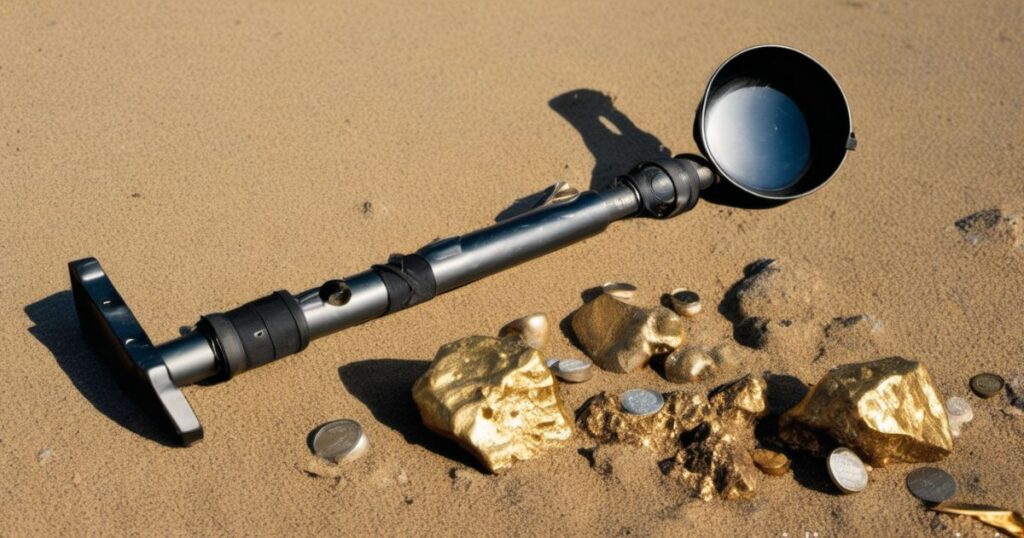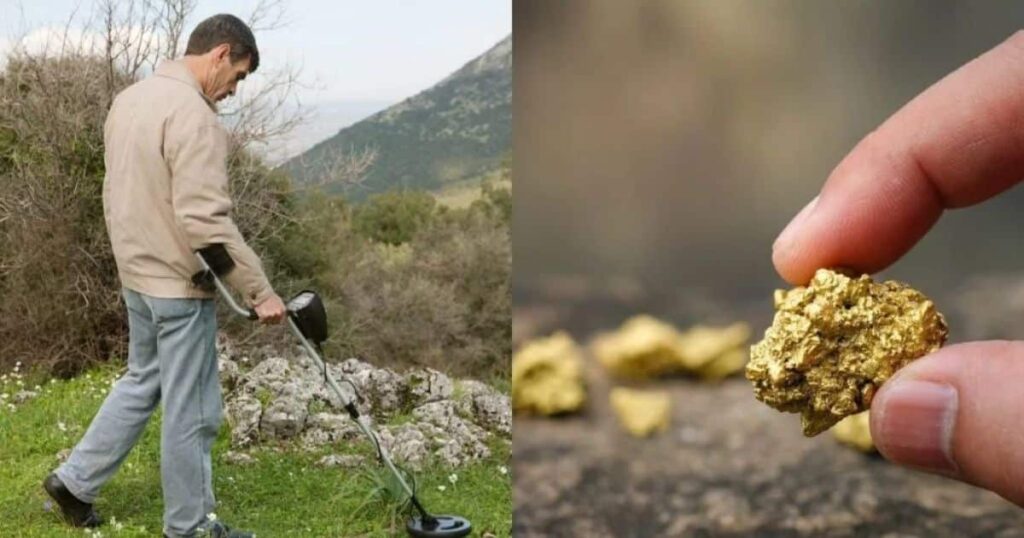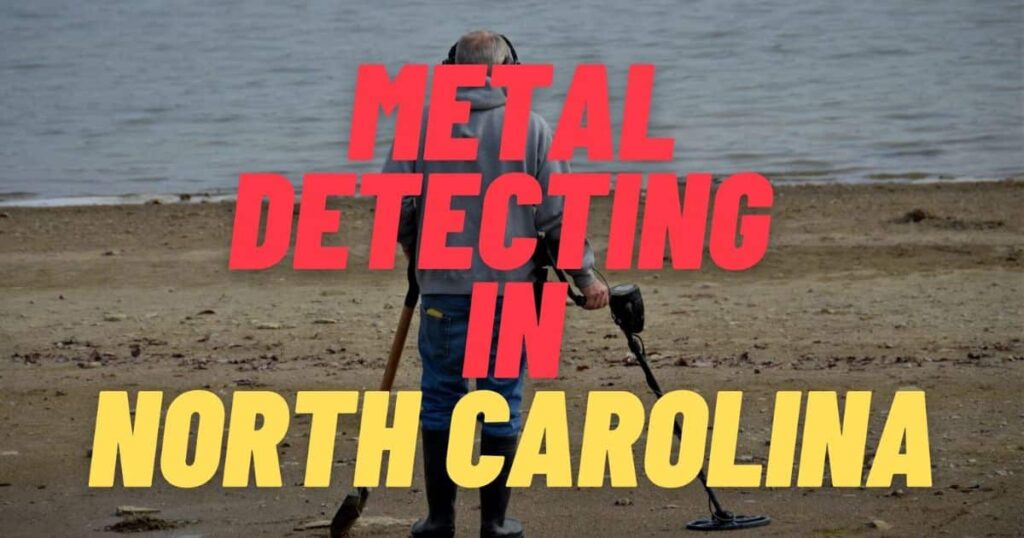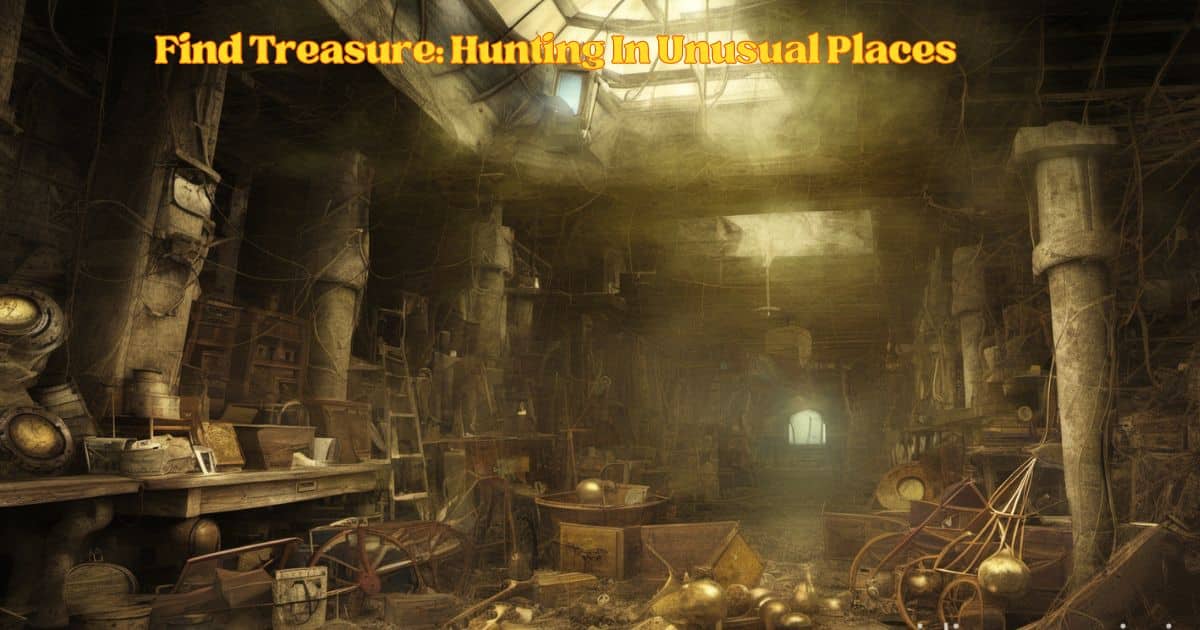You don’t need a treasure map or metal detector to uncover hidden gems. Everyday places harbor unique finds – from vintage toys in abandoned properties to jewelry tucked inside thrift store wares. Even parks and schools can yield antique coins and relics for those willing to search creatively. Expand your search beyond beaches and fields to maximize your treasure hunting potential.
Metal detecting often focuses on beaches, parks, and historic locations. However, overlooked public spaces also provide treasure hunting opportunities. Schools, fairgrounds, thrift stores, antique shops, abandoned properties, construction sites, and even your own backyard can reveal rare collectibles, vintage items, antique coins and jewelry, relics, and more unusual finds. Seek permission where required, but let your curiosity guide you to uncover hidden gems. In this article “Where To Find Treasure: Hunting In Unusual Places” We will discuss this further.
Treasure Hunting Locations: The Best Places To Find Hidden Treasure

Some of the top locations to search for hidden treasure include beaches, parks, playgrounds and former settlement or battle sites. Beaches in particular can yield intriguing finds as coins and jewelry are often lost and bury themselves under the sand over time. Parks that have been around for decades or centuries may still hold treasures left behind by past visitors or buried for safekeeping.
Battlefields and former settlement sites from the 18th century or before can harbor objects dropped or lost during turbulent times. research the history of such locations for clues about past inhabitants and events. Former campgrounds of Native American tribes may turn up arrowheads, tools or other significant artifacts.
Where To Find Treasure: Hunting In Unusual Places 2024
In 2024, the concept of “Treasure Hunting In Unusual Places” continues to captivate adventurers and historians alike. This year, the focus has shifted towards exploring unconventional locations that are often overlooked in the realm of treasure hunting. Urban landscapes, abandoned industrial sites, and rural homesteads are emerging as hotspots for those engaged in Treasure Hunting In Unusual Places, offering new opportunities to find hidden treasures.
Advances in technology, such as more sophisticated metal detectors and mapping tools, have made it easier to pinpoint potential treasure troves. Enthusiasts are combining historical research with modern technology to uncover relics and artifacts that shed light on local history and personal stories. As always, it’s crucial to hunt responsibly, respecting property rights and preserving historical integrity.
Start With The History Of Your Town
Researching the history of your local town is a good way to start narrowing down potential hot spots for treasure hunting. Learn about past settlements, commercial areas, battle sites and any other locations that saw frequent human activity decades or centuries ago. You can often find old maps and records at your local library that provide clues about where people congregated or traveled in the past.
Start your own database of potential sites to hunt, factoring in the types of items that might have been lost or abandoned at each place. Prioritize your initial searches at areas with the longest histories of use like parks, beaches and former town centers. Discussion with local historical and archaeological groups can also offer insightful tips.
Metal Detectors For Finding Treasure Near You
When it comes to finding buried treasures near you, an essential tool is a quality metal detector. Entry-level detectors starting around $100 can work for finding coins and small artifacts but for serious treasure hunting, investing in a mid-range or higher-end machine is advisable.
Top brands to consider include Garrett, Minelab, XP and Fisher Labs. Their specialized detectors priced $300-1000 often feature enhanced ground mineralization rejection capabilities, multiple search modes and headphones for maximum sensitivity to minute signals. Waterproof machines are also necessary for underwater hunting. Read reviews and try demoing different models to choose the best metal detector for your needs. (50 words)
Accessories For Finding Treasure Near You
Along with a quality detector, there are some essential accessories that improve hunts for buried treasures near you.
Sand Scoops
Sand scoops are used to gather and sift through wet beach sand quickly when a target signal is obtained. Choose a scoop at least 12 inches wide for efficient sand shifting.
Metal Detector Pinpointers
Pinpointers are small, handheld detectors that help precisely locate buried treasure under the sand or soil after a target is found. Waterproof pinpointer models are best for beach or sub-aqueous hunting.
Shovels
A small gardening shovel or spade is needed for carefully digging and excavating target areas without damaging any artifacts. Look for ergonomic designs with narrow, sturdy blades.
Headphones
Using high-quality, comfortable headphones allows faint signals to be heard clearly and target identification done with confidence, even in noisy environments. Waterproof options are necessary for surfside hunts.
Finding Gold Treasures Near You

Finding gold treasures requires a combination of research, exploration, and knowledge of geological and historical factors. Here are some general steps you can take to increase your chances of finding gold:
- Research the Geology:
-
- Learn about the geology of the area you’re interested in. Gold is often found in quartz veins associated with certain types of rock formations.
- Understand the local geological history, as gold deposits may be associated with specific geological events.
- Historical Research:
-
- Look into the history of the area. Old mining records, historical maps, and accounts of gold discoveries can provide valuable information.
- Consider areas where gold has been found in the past, as geological conditions may still be favorable.
- Use Metal Detectors:
-
- Metal detectors are valuable tools for prospecting. They can help you locate gold nuggets, flakes, or even buried treasure.
- Research the best metal detectors for gold prospecting and learn how to use them effectively.
- Join a Prospecting Club:
-
- Joining a local prospecting club can provide you with valuable insights from experienced prospectors.
- Members often share information about productive areas and may organize group outings for prospecting.
- Check Mining Claims:
-
- In many countries, you can check for active or abandoned mining claims. These claims may indicate areas where gold has been found in the past.
- Be aware of regulations and restrictions regarding prospecting and mining in your area.
- Explore Remote Areas:
-
- Sometimes, gold deposits are found in less-explored or remote areas. Be prepared for outdoor exploration, and use satellite imagery to identify potential locations.
- Consult with Geologists:
-
- Geologists can provide valuable insights into the geological features of an area and help you understand where gold might be located.
- Be Patient and Persistent:
-
- Finding gold treasures is often a patient and persistent process. It may take time and multiple attempts before you strike gold.
- Respect Regulations:
- Always respect local laws and regulations related to prospecting and mining. Obtain any necessary permits, and be aware of environmental considerations.
Remember that finding gold is not guaranteed, and there are no foolproof methods. It requires a combination of knowledge, research, and a bit of luck. If you’re new to prospecting, consider seeking guidance from experienced prospectors or joining a local prospecting community.
Our List Of Metal Detecting Clubs In 50 States
Here are the Meta Detecting Club 50 states name:
- Maryland Relic Hunters Association
- Massachusetts Relic and Relic Hunting Club
- Michigan Association of Relic Hunters
- Minnesota Treasure Hunters Club
- Mississippi Treasure Hunters
- Missouri Relic Hunters Association
- Montana Coin and Relic Association
- Nebraska Coin and Relic Association
- Nevada Treasure Hunters Club
- New Hampshire Relic Hunters Club
- New Jersey Relic Hunters Club
- New Mexico Relic Hunting Society
- New York Historical Artifact Society
- North Carolina Relic Hunters Club
- North Dakota Relic Recovery Club
- Ohio Relic Hunters Association
- Oklahoma Treasure Hunters
- Oregon Relic Recovery Club
- Pennsylvania Relic Hunters
- Rhode Island Relic Association
- South Carolina Relic Diggers
- South Dakota Relic Recovery Club
- Tennessee Historical Relic Association
- Texas Relic Hunters Society
- Utah Relic Recovery Club
- Vermont Relic Association
- Virginia Relic Recovery Club
- Washington Relic Hunters Club
- West Virginia Relic Association
- Wisconsin Relic Recovery Club
- Wyoming Relic Hunters
- Alabama Treasure Hunters
- Alaska Relic Recovery Club
- Arizona Relic Association
- Arkansas Treasure Hunters
- California Relic Society
- Colorado Relic Recovery Club
- Connecticut Relic Association
- Delaware Relic Society
- Florida Relic Hunters
- Georgia Relic Recovery Club
- Hawaii Relic Association
- Idaho Relic Recovery Club
- Illinois Relic Society
- Indiana Relic Association
- Iowa Relic Recovery Club
- Kansas Relic Recovery Club
- Kentucky Relic Recovery Club
- Louisiana Relic Association
- Maine Relic Recovery Club
Top 50 Spots For Metal Detecting Near Me List:
Here is a draft Top 50 Spots for Metal Detecting Near Me list:
- Local beaches – Old coins and jewelry often wash up on beaches. Check laws on beaches before detecting.
- Old parks – Historic parks may hold coins and relics from past decades.
- Old fairgrounds – Fairgrounds were popular community gathering spots and may hold items.
- Local schools – Playgrounds and sports fields on older school properties can yield finds.
- Ballfields – Baseball fields, soccer fields, and other sporting areas see lots of lost treasures.
- Old campgrounds – Veteran campers often lost valuables that could still be found today.
- Boat launches – Boaters frequently lose sunglasses, keys, and other metal items in water and sand.
- Forest preserves – Nature trails and picnic areas bring lost items within metal detector range.
- Old drive-in movie theater sites – Generations of families visited these outdoor theaters.
- Civil War battlefields – Conflict sites hold relics from bullets to uniform buttons.
- Old roads/rail lines – Transportation routes saw heavy traffic of people and goods over decades.
- Abandoned old homesites – Former settlements and foundations hold items near old growth trees.
- Old dump sites – Trash pits from past eras become treasure troves of discarded objects.
- Riverbanks – Flash floods and high water carried away personal items that washed ashore.
- Local historical landmarks – Places of interest attract visitors who sometimes misplace belongings.
- Rural farmland – Fields change uses over time but farming families once occupied those acres.
- Old county fairgrounds – Major community events brought lost valuables within the fair fence line.
- Community parks – Picnics and recreational activities leave coins, keys and jewelry at parks over years.
- Old rodeos/racetrack sites – Enthusiasts visited these sports venues starting decades ago.
- Bridle trails – Horse enthusiasts riding trails occasionally dropped equine tack and equipment.
- Archeological sites – Look for registered sites to detect relics near foundations or earthworks.
- Old orchards/plantations – Laborers and visitors occupied these lands for farming and leisure.
- Abandoned buildings – Structures standing empty attract trespassers leaving items behind.
- Backyards/gardens of historic homes – Generations of families occupied these spaces.
- Boat docks/fishermen spots – Marinas, piers and shorelines see regular foot traffic and activities.
- Hiking trails – Recreational paths bring hikers close enough to accidentally misplace valuables.
- Veteran/memorial parks – Community areas built to honor service members past and present.
- Vintage family cemeteries – Final resting places predate modern headstones and markers.
- Old mills and industrial sites – Workers operating machinery or transporting goods may lose items.
- Remote picnic areas – Secluded natural sites host campers and outdoor enthusiasts.
- Sand/gravel pits – Resources extracted on private property leave detection openings.
- Outdoor concert venues – Music fans attending events sometimes misplace cell phones and such.
- Swimming holes – Recreation areas along creeks and rivers see accidental losses over the years.
- Baseball card/comic conventions – Major collectors events occur in hotel meeting spaces or fairgrounds.
- Stormwater drains/retention ponds – Flood zones concentrate valuables washed away in surges.
- Abandoned settlements/homesteads – Families occupied these rural ghost towns long before.
- Neighborhood playgrounds/pocket parks – Tiny community greenspaces see lots of children’s activities.
- Old drive-in/outdoor movie theater lots – Enjoyment areas from mid-20th century entertainment.
- Outdoor flea markets – Weekend bazaars take place in fairgrounds, mall parking lots and such.
- Historical re-enactments – Events bring costumed interpreters to staged community gatherings.
- Hobby/collector shows – Conventions for coin/artifact/memorabilia collectors use public venues.
- Water access points – Boat ramps, swimming areas and shorelines see accidental losses in water.
- Backroad pull-offs – Scenic overlooks attract distracted drivers dropping objects from vehicles.
- Vacant fields/open lots – Detectors find items in undeveloped in-town spaces sometimes slated for buildings.
- Service station sites – Generations of motorists lost items at gas stops, many long abandoned.
- Reservoir beaches – Popular swimming spots see accidental losses washed ashore or buried in sand.
- Garden/community gardens – Local green spaces planted and tended by neighborhoods and organizations.
- Snowmobile/ATV trails – Winter and off-road routes take enthusiasts through detection areas.
- Nearby historical society property – Community groups may have outdoor greenspace to scan.
- Country roadsides – Scenic byways see curious tourists stopping to snap photos losing possessions.
Be Opportunistic: Stay Tuned To Construction Projects, Urban Developments
When construction crews break ground on developments, they stir up dirt that has been undisturbed for decades or centuries. This ground disturbance can bring long-buried metals to the surface, presenting great opportunities for treasure hunting with a metal detector. Contact local contractors and offer to scan sites for valuables after work hours.
They may appreciate you retrieving scrap metal before it ends up in landfill. Besides construction zones, keep an eye out for urban renewal projects like new sidewalks or roads. Query city planners about checking these areas before they’re fully developed. With permission, you could make exciting historical finds in the turned earth. Staying plugged into community plans will help you locate new detecting adventures.
Best Places To Metal Detect In North Carolina

North Carolina offers a variety of exciting locations for metal detecting enthusiasts. Here are some of the best places to explore:
- Reed Gold Mine: Known for small gold nuggets, coins, and tokens.
- Cape Lookout National Seashore: Ideal for finding metal artifacts and relics.
- Lucky Strike Gold Mine: Located in Marion, it’s a former gold mine where you can find small gold nuggets and coins.
- Dana: A small, rural community in the Appalachian Mountains, rich in history.
- Wrightsville Beach: A popular spot with areas like the towel line and far north end being promising for treasure hunting.
- Carova Beach: Known for its serene environment and lack of public access roads, making it a unique spot for detecting.
- Carolina Beach: A lively beach with opportunities to find rings, watches, tokens, buttons, and coins.
- Topsail Island: Notable for revealing a variety of objects following Hurricane Florence in 2018.
Additionally, there are other locations worth exploring, such as the grounds of the Cloud Chamber for the Trees and Sky in Raleigh, the abandoned Henry River Mill Village in Hildebran, the area around Helen’s Bridge in Asheville, and several others. These places, due to their rich history and varied landscapes, provide ample opportunities for discovering treasures ranging from coins to relics of the past.
While metal detecting is generally allowed in North Carolina, there are some restrictions, especially in state parks and on certain beaches. It’s important to obtain necessary permits and adhere to local laws and regulations regarding metal detecting. For beach detecting, areas like the towel line and near the water’s edge are recommended. However, some beaches may have specific restrictions or may not allow metal detecting at all, so it’s important to check local ordinances.
Top 10 Rumored Locations Of Long Lost Treasure
here are ten of the most rumored locations of long lost treasures:
- Oak Island, Nova Scotia, Canada: Famous for the Oak Island mystery involving a potential buried treasure, which has been the subject of many exploratory efforts.
- Cocos Island, Costa Rica: Allegedly the location where pirate Captain William Thompson buried his treasure, including gold coins and precious gems.
- Montezuma’s Treasure, Mexico: Believed to be a vast store of Aztec gold and jewels hidden before the Spanish conquest.
- San Miguel Island, California, USA: Rumored site of a Spanish galleon wreck containing gold coins.
- The Lost Dutchman’s Gold Mine, Arizona, USA: A legendary gold mine in the Superstition Mountains, yet to be found.
- The Amber Room, Russia: A world-renowned chamber decorated in amber panels, gold leaf, and mirrors, looted by Nazis during World War II and missing since.
- The Treasure of Lima, Peru: A vast hoard of stolen gold, silver, and jewels from a Spanish galleon, hidden and never recovered.
- The Ark of the Covenant, Ethiopia: Said to contain the Ten Commandments, and rumored to be hidden in a church in Ethiopia.
- The Tomb of Genghis Khan, Mongolia: Presumed to contain large treasures, its exact location remains a secret.
- Jesse James’ Gold: Believed to be buried by the infamous outlaw in the Keechi Hills, Oklahoma.
Frequently Asked Questions (FAQ)
Where can I find a metal detecting spot?
Research public parks, campgrounds, beaches and other recreational areas that allow metal detecting with the proper permissions or permits.
Can I metal detect at my local park?
You can if the park allows it, be sure to check regulations and get any required permits before metal detecting there.
Is it illegal to metal detect in national parks?
Yes, metal detecting is generally prohibited in national parks and on federal lands without specific permission.
What are metal detecting clubs?
Clubs of hobbyists who meet to metal detect together, share tips, and preserve the hobby. They often have access to private land.
Conclusion
In conclusion, the quest for treasure in unusual places is a thrilling and potentially rewarding adventure. Venturing beyond the common beaches, parks, and historical sites opens up a world of possibilities. Exploring less-traveled areas like abandoned buildings, old schools, and forgotten public spaces can yield unique finds. Remember, each location has its own history and secrets waiting to be uncovered. As you embark on this journey, always respect property rights and local laws. With patience, research, and a bit of luck, you might just unearth hidden treasures that tell stories of the past, adding an exciting chapter to your own treasure hunting tale. Learn more Metal Detectors information “Will Metal Detectors Catch My Disposable Vape?“











